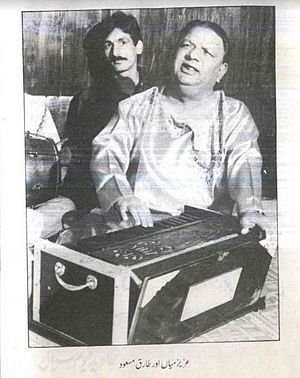Aziz Mian facts for kids
Quick facts for kids
"Shahenshah-e-Qawwali"
Aziz Mian Qawwal
Pride of Performance
|
|
|---|---|

Qawwal
|
|
| Background information | |
| Birth name | Abdul Aziz |
| Also known as | Shahenshah-e-Qawwali Aziz Mian Meeruthi |
| Born | 17 April 1942 Delhi, British India |
| Died | 6 December 2000 (aged 58) Tehran, Iran - (buried in Multan, Pakistan) |
| Genres | Qawwali, Ghazal |
| Occupation(s) |
|
| Instruments | Harmonium |
| Years active | 1966 – 2000 |
| Labels | EMI Pakistan, Oriental Star Agencies, Columbia Records |
Aziz Mian Qawwal (Urdu: عزیز میاں قوال) was a famous Pakistani qawwal (a singer of devotional music). He was born on April 17, 1942, and passed away on December 6, 2000. He was known for his unique way of singing ghazals (a type of poem or song) within the qawwali style. Many people consider him one of the greatest qawwals in South Asia. He even holds a record for the longest commercially released qawwali, Hashr Ke Roz Yeh Poochhunga, which is over 150 minutes long! People gave him special nicknames like "Shahenshah-e-Qawwali" (King of Qawwali) and "Fauji Qawwal" (Military Singer).
Contents
Early Life and Education
Aziz Mian was born as Abdul Aziz in Delhi, which was part of British India at the time. The word Mian, which he often used in his songs, became part of his stage name. He also started calling himself Aziz Mian Meeruthi. This name came from Meerut, a city in northern India, where his family was from before they moved to Pakistan in 1947.
When he was ten years old, Aziz Mian started learning to play the harmonium. He studied under a teacher named Ustad Abdul Wahid Khan in Lahore. He spent sixteen years training at the Data Ganj Baksh School in Lahore. He also earned master's degrees in Urdu literature, Islamic studies, and Philosophy. Plus, he got a bachelor's degree in English studies from the University of the Punjab in Lahore.
A Unique Musical Career
Aziz Mian was known for being different from other Pakistani Qawwals. He had a very strong and distinctive voice. Unlike most qawwals, he often wrote his own song lyrics. He also performed songs written by other famous poets. Aziz Mian was a contemporary of the Sabri Brothers, another well-known qawwali group.
He started by performing at private events. His big break came in 1966 when he performed for the Shah of Iran, Mohammad Reza Pahlavi. The Shah was so impressed that he gave Aziz Mian a gold medal! After this, Aziz Mian became very popular and began releasing his own music albums.
In his early career, he was called Fauji Qawwal (Military Qawwal). This was because he often performed for army personnel in military barracks. He was known for his dramatic way of singing. He focused on the religious side of qawwali, but he also had success with more romantic Sufi qawwalis.
Aziz Mian enjoyed exploring deep religious and Sufi ideas in his music. He sometimes directly spoke to Allah in his songs, talking about human struggles. Besides his own poems, he sang works by famous poets like Allama Iqbal, Qamar Jalalvi, and Qateel Shifai.
Passing and Legacy
Aziz Mian passed away on December 6, 2000, in Tehran, Iran. He was there to perform at an event. He is buried in Multan, Pakistan.
Every year, his death anniversary, called an Urs, is celebrated. It happens on the first Thursday of May. The celebrations include special ceremonies and performances by several qawwal groups. His son, Shibli Aziz Mian, helps organize these events. Shibli is also interested in Sufi traditions and continues his father's spiritual work.
Aziz Mian Qawwal is remembered as one of Pakistan's most influential Sufi Qawwali singers. His music continues to inspire many.
- One of his famous qawwalis, Main Sharabi, was featured in the Indian movie Cocktail. His son, Imran Aziz Mian, sang it for the film.
- A bridge near his shrine in Multan was named the Aziz Mian Bridge in his honor.
Awards and Recognition
Aziz Mian received important awards for his contributions to music:
- In 1966, he performed for the Shah of Iran, Mohammad Reza Pahlavi, and was awarded a Gold Medal.
- The Government of Pakistan honored him with the Pride of Performance medal in 1989. This award recognizes people who have done great things for Pakistan.
Famous Works
Aziz Mian Qawwal gained worldwide fame for his amazing musical works. Some of his well-known pieces include:
- Teri Soorat Nigahon Mein Phirti Rahe / Main Sharabi Main Sharabi
- Allah Hi Jaane Kaun Bashar Hai
- Nabi Nabi Ya Nabi Nabi
- Aadmi Hai Benazir
- Meri Daastan E Hasrat
- Bewafa Yun Tera Muskurana Bhool Jaane Ke Qaabil Nahi Hai
- Hashr Ke Roz Main Poochoonga
Albums
Aziz Mian released many albums throughout his career. Here are a few examples:
- 1976 Aziz Mian (EMI Pakistan)
- 1977 Aziz Mian Qawwal & Party (EMI Pakistan)
- 1979 Aziz Mian & Others – Teri Soorat Nigahon Mei Phirti Rahe / Main Sharabi (EMI Pakistan)
- 1980 Nabi Nabi Ya Nabi Nabi (EMI Pakistan)
- 1984 Hashr Ke Roz Volume – 1 & 2 (EMI Pakistan)
- 1993 Sharabee Live in England (OSA Records)
- 1997 Allah Hi Jane Live in England (OSA Records)
- 2003 Duniya Ka Ajeeb Bazaar – Last Recording (OSA Records)
He also appeared as a contributing artist on other albums:
- 1987 Maikhana – Aziz Miyan & Sabri Brothers (EMI Pakistan)
- 2006 The Best Qawwali Album in the World Ever – Nusrat Fateh Ali Khan, The Sabri Brothers & Aziz Mian (EMI Pakistan)
 | Anna J. Cooper |
 | Mary McLeod Bethune |
 | Lillie Mae Bradford |

